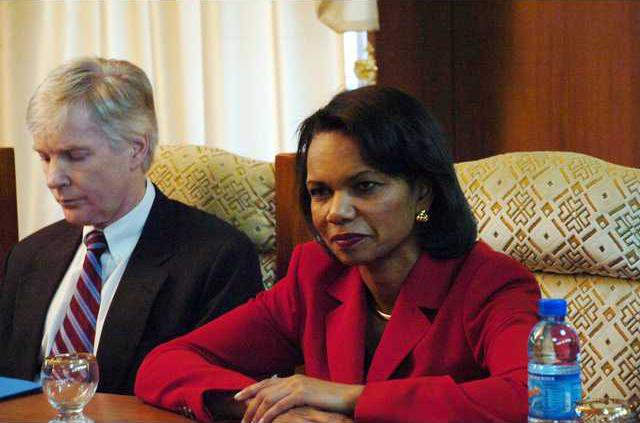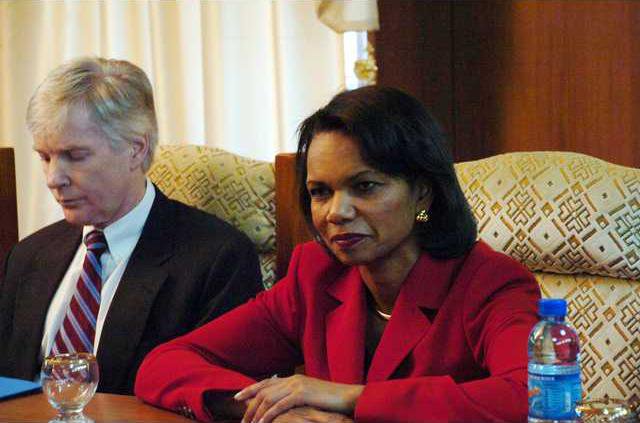KIRKUK, Iraq — Secretary of State Condoleezza Rice said Tuesday the United States, Iraq and Turkey have a ‘‘common interest’’ in stopping Kurdish rebels in northern Iraq, and told Iraqi leaders they still have urgent work ahead to unite the country.
‘‘This is a circumstance in which ... we need an overall comprehensive approach to this problem,’’ Rice said during a brief, unannounced visit to Baghdad and the contested oil capital Kirkuk in the north. ‘‘No one should do anything that threatens to destabilize the north.’’
Turkey launched a small operation across the border overnight Tuesday, and its soldiers were still in Iraq when Rice arrived in nearby Kirkuk. Turkey says it must cross the border to pursue Kurdish rebels who use the border region to attack Turkey. Iraq’s government objects and the United States has stood between its two close allies for months.
The border problem has also soured U.S. relations with the semiautonomous Iraqi Kurds. Rice did not hold a separate meeting with the Kurdish leadership while in Kirkuk, and Kurdish leader Massoud Barzani refused to attend a meeting with her in Baghdad to protest the U.S. position that limited cross-border attacks are legitimate.
Kurdish leaders have also chafed under U.S. demands for greater inclusion in the Baghdad government and swifter work to complete a framework law for managing and distributing Iraq’s oil wealth.
On Sunday, Turkey sent as many as 50 fighter jets into Iraq to conduct airstrikes against rebels from the Kurdish Workers’ Party, or PKK. The planes attacked several villages, killing one woman, Iraqi officials said.
Iraqi leaders had complained Monday that Turkey did not coordinate with Baghdad before the largest aerial attack in years against the outlawed separatist group. Turkey’s military chief said the strikes used U.S. intelligence, and U.S. officials said Washington was informed of the plan.
The Turkish army also sent soldiers about 1.5 miles into northern Iraq in an overnight operation on Tuesday, Kurdish officials said. Kurdish officials said the Turkish troops left Iraq about 15 hours later.
Rice made it clear the United States supports efforts to quash any rebel movement, but she said it was a ‘‘Turkish decision’’ to act.
In Washington, White House press secretary Dana Perino said she would not comment on the new operation until there was more concrete information about how far the incursion went, how many people were involved and other details.
‘‘Of course we are coordinating with the Turkish and Iraqi authorities in the area,’’ Perino said. ‘‘The PKK is a threat to Turkey, to Iraq and to the United States. And so we continue to share information, share intelligence.’’
Rice’s visit Tuesday was meant to underscore an overall reduction in violence that the Bush administration largely attributes to the escalation of U.S. forces Bush ordered a year ago. The military claims attacks in Iraq are at their lowest levels since the first year of the American invasion in 2003, finally opening a window for reconciliation among rival sects.
Rice said she is more hopeful than a year ago that Iraq’s political factions can work side by side, and she cited scattered progress on some national political problems that had stalemated the U.S.-backed government.
After repeated disappointments, however, Rice did not make bold predictions about what the Shiite-led government will do after she leaves. She said she told leaders they must quickly follow up on the promise of a political bargain sketched in August.
‘‘These improvements show that Iraqis can count on a future (in which) violence is not necessarily a daily part of life,’’ Rice said at a press conference in Baghdad with Iraqi Foreign Minister Hoshyer Zebari. She also met with Prime Minister Nouri al-Maliki and President Jalal Talibani, among others.
Like President Bush’s trip to once-volatile Anbar province in September, Rice’s visit to Kirkuk highlighted the kind of political accommodations Iraqis are making apart from the central government in Baghdad.
Rice talked about development projects and economic challenges with members of a civilian-military reconstruction unit based in the mixed city. She also sat down with about two-dozen provincial politicians of all stripes.
‘‘It is an important province for the future of Iraq, for a democratic Iraq, an Iraq that can be for all people,’’ she said at the start of the meeting with the provincial leaders.
Sunni Arabs ended a yearlong political boycott earlier this month in Kirkuk — the hub of Iraq’s northern oil fields — under a deal that sets aside government posts for Arabs. It was the biggest step yet toward unity ahead of a referendum expected in the second half of next year.
Rice’s visit was her first since she accompanied Bush to Anbar in western Iraq, and her first to Baghdad since the early weeks of the troops escalation last spring.
Rice’s message to Iraqi leaders sounded familiar: Stop squabbling. But her top adviser on Iraq said there is a twist.
‘‘She’s saying, ’Look, see what’s been done as a result of your efforts, our efforts, on security, on economics. You guys have gotta catch up,’’’ State Department Iraq coordinator David Satterfield said.
‘‘This is a circumstance in which ... we need an overall comprehensive approach to this problem,’’ Rice said during a brief, unannounced visit to Baghdad and the contested oil capital Kirkuk in the north. ‘‘No one should do anything that threatens to destabilize the north.’’
Turkey launched a small operation across the border overnight Tuesday, and its soldiers were still in Iraq when Rice arrived in nearby Kirkuk. Turkey says it must cross the border to pursue Kurdish rebels who use the border region to attack Turkey. Iraq’s government objects and the United States has stood between its two close allies for months.
The border problem has also soured U.S. relations with the semiautonomous Iraqi Kurds. Rice did not hold a separate meeting with the Kurdish leadership while in Kirkuk, and Kurdish leader Massoud Barzani refused to attend a meeting with her in Baghdad to protest the U.S. position that limited cross-border attacks are legitimate.
Kurdish leaders have also chafed under U.S. demands for greater inclusion in the Baghdad government and swifter work to complete a framework law for managing and distributing Iraq’s oil wealth.
On Sunday, Turkey sent as many as 50 fighter jets into Iraq to conduct airstrikes against rebels from the Kurdish Workers’ Party, or PKK. The planes attacked several villages, killing one woman, Iraqi officials said.
Iraqi leaders had complained Monday that Turkey did not coordinate with Baghdad before the largest aerial attack in years against the outlawed separatist group. Turkey’s military chief said the strikes used U.S. intelligence, and U.S. officials said Washington was informed of the plan.
The Turkish army also sent soldiers about 1.5 miles into northern Iraq in an overnight operation on Tuesday, Kurdish officials said. Kurdish officials said the Turkish troops left Iraq about 15 hours later.
Rice made it clear the United States supports efforts to quash any rebel movement, but she said it was a ‘‘Turkish decision’’ to act.
In Washington, White House press secretary Dana Perino said she would not comment on the new operation until there was more concrete information about how far the incursion went, how many people were involved and other details.
‘‘Of course we are coordinating with the Turkish and Iraqi authorities in the area,’’ Perino said. ‘‘The PKK is a threat to Turkey, to Iraq and to the United States. And so we continue to share information, share intelligence.’’
Rice’s visit Tuesday was meant to underscore an overall reduction in violence that the Bush administration largely attributes to the escalation of U.S. forces Bush ordered a year ago. The military claims attacks in Iraq are at their lowest levels since the first year of the American invasion in 2003, finally opening a window for reconciliation among rival sects.
Rice said she is more hopeful than a year ago that Iraq’s political factions can work side by side, and she cited scattered progress on some national political problems that had stalemated the U.S.-backed government.
After repeated disappointments, however, Rice did not make bold predictions about what the Shiite-led government will do after she leaves. She said she told leaders they must quickly follow up on the promise of a political bargain sketched in August.
‘‘These improvements show that Iraqis can count on a future (in which) violence is not necessarily a daily part of life,’’ Rice said at a press conference in Baghdad with Iraqi Foreign Minister Hoshyer Zebari. She also met with Prime Minister Nouri al-Maliki and President Jalal Talibani, among others.
Like President Bush’s trip to once-volatile Anbar province in September, Rice’s visit to Kirkuk highlighted the kind of political accommodations Iraqis are making apart from the central government in Baghdad.
Rice talked about development projects and economic challenges with members of a civilian-military reconstruction unit based in the mixed city. She also sat down with about two-dozen provincial politicians of all stripes.
‘‘It is an important province for the future of Iraq, for a democratic Iraq, an Iraq that can be for all people,’’ she said at the start of the meeting with the provincial leaders.
Sunni Arabs ended a yearlong political boycott earlier this month in Kirkuk — the hub of Iraq’s northern oil fields — under a deal that sets aside government posts for Arabs. It was the biggest step yet toward unity ahead of a referendum expected in the second half of next year.
Rice’s visit was her first since she accompanied Bush to Anbar in western Iraq, and her first to Baghdad since the early weeks of the troops escalation last spring.
Rice’s message to Iraqi leaders sounded familiar: Stop squabbling. But her top adviser on Iraq said there is a twist.
‘‘She’s saying, ’Look, see what’s been done as a result of your efforts, our efforts, on security, on economics. You guys have gotta catch up,’’’ State Department Iraq coordinator David Satterfield said.

